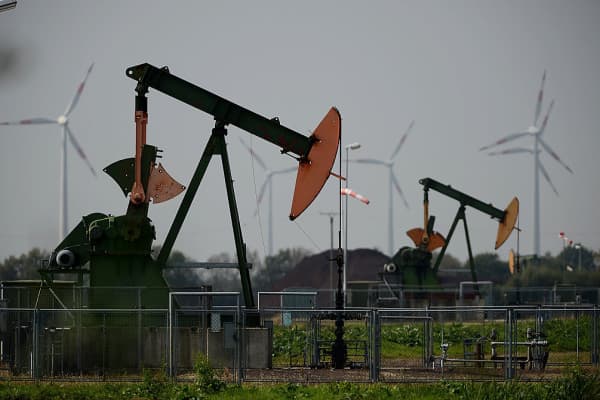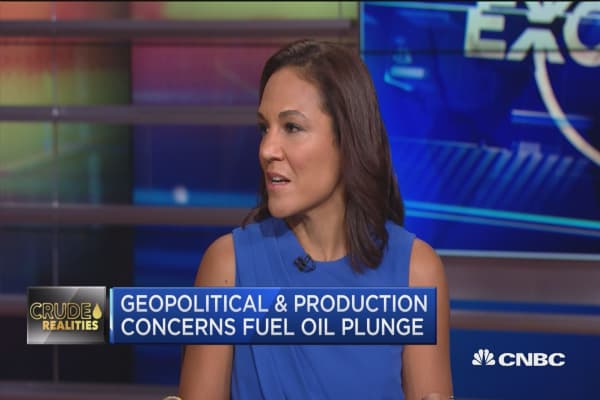 Iran's exit from nuclear weapons treaty would pour 'rocket fuel' on oil market, says analyst
Iran's exit from nuclear weapons treaty would pour 'rocket fuel' on oil market, says analyst
- The U.S. exit from the Iran nuclear deal creates the risk that Iran will leave a 50-year-old U.N. treaty to stop atomic weapons proliferation, said RBC Capital Market's Helima Croft.
- An Iranian exit from the 1968 treaty would be like "rocket fuel" for oil prices and potentially spark an arms race in the Middle East.
- Analysts say President Donald Trump's decision to leave the separate 2015 Iran nuclear deal puts Saudi Arabia back in control of the oil market.
Oil market is ignoring the big Iran story, says strategist
The U.S. exit from the Iran nuclear deal creates the risk that Iran will drop out of a separate 50-year-old United Nations treaty meant to stop the spread of atomic weapons, according to Helima Croft, global head of commodity strategy at RBC Capital Markets.
Oil prices have recently surged to 3½-year highs, fueled the U.S. nuclear deal pullout and falling output in Venezuela. However, crude prices began tumbling last week after Saudi Arabia and Russia said two dozen oil-producing nations could soon ease output caps that have been in place since January 2017.
But fears of nuclear weapons proliferation in the restive Middle East could quickly reverse that drop, according to Croft.
An Iranian official threatened last week to pull out of the U.N. Treaty on the Non-Proliferation of Nuclear Weapons, which has sought to prevent the spread of atomic weapons since 1968. Iran signed the treaty that year, but the nation's leadership in Tehran is now in a standoff with the West over its nuclear program after President Donald Trump abandoned the 2015 nuclear deal and restored punishing sanctions on the Middle Eastern country.
"If they come to believe that the U.S. and the regional partners are pursuing regime change, I think we could get a very nasty Iranian response."
"I think this is the question the market is ignoring right now. I would watch very closely the Iranian announcement to pull out of the nonproliferation treaty," Croft told CNBC's "Squawk on the Street" on Tuesday. "If they pull out of the NPT, that would signal that not only are the Iranians going to resume their program, they're resuming it with a military option."
"And then it would become, I think, an arms race in the Middle East," she added.
In March, Saudi Arabia's Crown Prince Mohammed bin Salman said his country would obtain a nuclear weapon "as soon as possible" if Iran, the kingdom's archrival, developed one. Israel, which has recently engaged in open conflict with Iran, is widely believed to possess nuclear weapons already.
Iran came under international criticism in the early 2000s and was later sanctioned for its alleged research into nuclear weapons development while ostensibly pursuing a peaceful energy program. After years of diplomacy, Iran reached a deal with six world powers that lifted the sanctions in exchange for Tehran accepting limits on its nuclear program and allowing inspectors into the country.
Under the NPT, countries without nuclear weapons like Iran vow never to acquire them. The 2015 nuclear deal — negotiated with Britain, China, France, Germany, Russia and the Obama administration — subjected Iran to extra scrutiny in order to re-establish trust with the international community.
"And then it would become, I think, an arms race in the Middle East," she added.
In March, Saudi Arabia's Crown Prince Mohammed bin Salman said his country would obtain a nuclear weapon "as soon as possible" if Iran, the kingdom's archrival, developed one. Israel, which has recently engaged in open conflict with Iran, is widely believed to possess nuclear weapons already.
Iran came under international criticism in the early 2000s and was later sanctioned for its alleged research into nuclear weapons development while ostensibly pursuing a peaceful energy program. After years of diplomacy, Iran reached a deal with six world powers that lifted the sanctions in exchange for Tehran accepting limits on its nuclear program and allowing inspectors into the country.
Under the NPT, countries without nuclear weapons like Iran vow never to acquire them. The 2015 nuclear deal — negotiated with Britain, China, France, Germany, Russia and the Obama administration — subjected Iran to extra scrutiny in order to re-establish trust with the international community.
But the pressure campaign now being waged by the Trump administration could push Iran to abandon both the nuclear deal and the NPT, Croft said. The European Union is trying to preserve the 2015 deal, but America's influence over the global financial system means many European companies may toe the U.S. line, despite the EU's efforts to shield them from far-reaching sanctions.
Iran's economy is already weakening, spurring protests over corruption in the banking system and other grievances. This year, Iran's currency has collapsed, and its uncertain how Iran will respond to the added pressure from a loss of international business, said Croft.
"If they come to believe that the U.S. and the regional partners are pursuing regime change, I think we could get a very nasty Iranian response," she said.
U.S. Secretary of State Mike Pompeo's first major speech last week drew speculation that the administration's policy is indeed to topple the nearly 40-year-old regime in Tehran. While Pompeo has sought to tamp down that speculation, the Iranians may not be convinced, said John Kilduff, founding partner at energy hedge fund Again Capital.
"They're like playing a game of Jenga, where you push the blocks out, because they're hoping for the regime to tip over," he told "Squawk on the Street" on Tuesday.
"And as much as European Union officials are trying to say that they want to have a workaround against these U.S. sanctions, all the companies, the banks and the oil companies, are all in the process of pulling out and saying we're not touching that with a 10-foot pole."
Iran's economy is already weakening, spurring protests over corruption in the banking system and other grievances. This year, Iran's currency has collapsed, and its uncertain how Iran will respond to the added pressure from a loss of international business, said Croft.
"If they come to believe that the U.S. and the regional partners are pursuing regime change, I think we could get a very nasty Iranian response," she said.
U.S. Secretary of State Mike Pompeo's first major speech last week drew speculation that the administration's policy is indeed to topple the nearly 40-year-old regime in Tehran. While Pompeo has sought to tamp down that speculation, the Iranians may not be convinced, said John Kilduff, founding partner at energy hedge fund Again Capital.
"They're like playing a game of Jenga, where you push the blocks out, because they're hoping for the regime to tip over," he told "Squawk on the Street" on Tuesday.
"And as much as European Union officials are trying to say that they want to have a workaround against these U.S. sanctions, all the companies, the banks and the oil companies, are all in the process of pulling out and saying we're not touching that with a 10-foot pole."
Saudis back in control
Helima Croft talks about Saudi Arabia and Russia's impact on the oil market
Both Croft and Kilduff said Trump's pullout has given Saudi Arabia the upper hand in the oil market. Trump essentially made a bargain to pull out of the Iran deal so long as the Saudis agreed to increase oil output to offset any price spike that resulted from the loss of Iranian crude supplies, according to Croft.
U.S. Treasury Secretary Steve Mnuchin recently told reporters the United States held discussions with "various parties" to pump more to offset falling Iranian exports, which could raise gasoline prices for American drivers.
"We're back hat in hand to the Saudis saying put more barrels on the market," Croft said.
"This is the issue, is that the U.S. cannot deal with a supply shock. We have to go back to countries that hold spare capacity. So when Venezuela potentially loses over the course of a year a million barrels, if we take off several hundred additional Iranian barrels, Saudi Arabia has to fill the gap."
While the United States is pumping about 10.7 million barrels a day — overtaking Saudi Arabia and closing in on top producer Russia — bottlenecks in western Texas will prevent American drillers from fully compensating for lost Iranian supplies, Kilduff said.
"If there's one thing this episode should tell us all, we are not the swing producer. Saudi Arabia is," he said. "They're more in control now than I've ever seen."
U.S. Treasury Secretary Steve Mnuchin recently told reporters the United States held discussions with "various parties" to pump more to offset falling Iranian exports, which could raise gasoline prices for American drivers.
"We're back hat in hand to the Saudis saying put more barrels on the market," Croft said.
"This is the issue, is that the U.S. cannot deal with a supply shock. We have to go back to countries that hold spare capacity. So when Venezuela potentially loses over the course of a year a million barrels, if we take off several hundred additional Iranian barrels, Saudi Arabia has to fill the gap."
While the United States is pumping about 10.7 million barrels a day — overtaking Saudi Arabia and closing in on top producer Russia — bottlenecks in western Texas will prevent American drillers from fully compensating for lost Iranian supplies, Kilduff said.
"If there's one thing this episode should tell us all, we are not the swing producer. Saudi Arabia is," he said. "They're more in control now than I've ever seen."


No comments:
Post a Comment